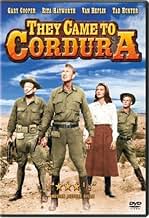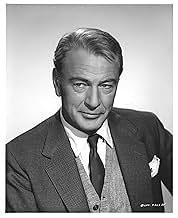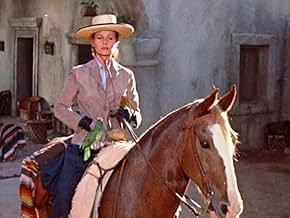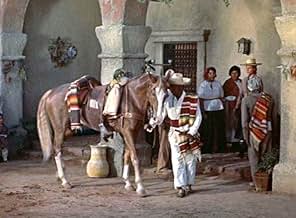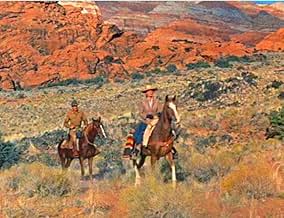Un major de l'armée, lui-même coupable de lâcheté, est invité à recommander des soldats pour la médaille d'honneur du Congrès lors de l'incursion à la frontière mexicaine de 1916.Un major de l'armée, lui-même coupable de lâcheté, est invité à recommander des soldats pour la médaille d'honneur du Congrès lors de l'incursion à la frontière mexicaine de 1916.Un major de l'armée, lui-même coupable de lâcheté, est invité à recommander des soldats pour la médaille d'honneur du Congrès lors de l'incursion à la frontière mexicaine de 1916.
- Réalisation
- Scénario
- Casting principal
- Récompenses
- 1 victoire et 1 nomination au total
- Capt. Paltz
- (as James Bannon)
- Cavalry Trooper
- (non crédité)
Avis à la une
Set in 1916, the film centres on a US military expedition deep into Mexico, a punitive response to Pancho Villa's raid on American territory. Gary Cooper plays Thorn, and though he invests his character with a certain quiet dignity, he can hardly be accused of acting.
Thorn is despatched back to the USA with a small group of men, each of whom is to be decorated for valour. As the Cavalry's Awards Officer, Thorn will have to prepare citations, and he obsessively quizzes the men about why they did what they did, how they felt at the time, and so forth.
Typically for a film of its era, "Cordura" assembles a melange of ethnic tokens, throws them into a difficult situation, then concentrates on the tensions and confrontations which result. Richard Conte is Truby, the crafty latin type, and Van Heflin plays Chawk, the angosaxon brute. Dick York is Renziehausen, the German American from (where else?) Wisconsin. Thorn is hoping to learn the secret of courage from his motley crew, but discovers that the answer to his question can only be found within himself.
Nice angles are developed to open out the plot's basic premise. A cavalry charge against the Mexicans looks like dashing American heroism, but might be no more than cynical fakery on the part of medal-hunting Colonel Rogers. Chawk might be an unfeeling ruffian rather than a hero. The arrival in the group of Mrs. geary (Rita Hayworth) complicates the issues, because the presence of a beautiful woman causes the men's interests to diverge.
The Mexican terrain is spectacular, and the film's central proposition is an interesting one, but the end product is so-so. It is difficult to warm to Cooper as an actor, or indeed to his character. Tab Hunter (as Lieutenant Fowler) goes way over the top. Thorn's sudden perking-up beside the rail track is a ludicrous event.
Verdict - Would-be essay on the wellsprings of human courage peters out into humdrum adventure yarn.
Also, confidence in people can change them and reform them.
The acting is superb throughout, and Gary Cooper captures wonderfully the gradual decline as he leads his motley crew on a trek to survival through the desert. An heroic performance to match the hero he portrays.
This is movie that deserves more acclaim than it has received.
In my book this is a must see. Great fare for Sunday afternoon on the couch!
Despite pretty much ignoring the interesting history that serves as a backdrop to this film, this is actually still quite an interesting film that was a lot rawer than I expected it to be, given the period in which it was made. In the early stages it was too basic and I worried that the whole thing would be as clunky as Thorn's early questioning of some of his "heroes", but gradually it got better as it went on and simple lines such as hero and coward were eroded away. This is not to say it is brilliant because it most certainly is not but it is certainly interesting for what it tries to do. It doesn't help that the script really labours the surface but lacks the ability to go significantly deep to really make an impact. However even with this, it was still interesting enough to hold me and I did enjoy the solid if simplistic moral debate that it delivered.
Rossen and his cinematography do great work with the wide-open landscapes but the former must also carry the can for not bringing more emotion out of the script consistently. As a result the cast do well without really excelling with nobody guiding them deeper, this is really what I could have expected. Cooper is as solid as usual with what I suppose was a brave role for him to take. He deals with it well but perhaps wasn't good enough to really convince in layers although he is superficially good enough. Hayworth doesn't have that great a character and her delivery occasionally gets a bit too over-the-top when asked to deliver more emotionally charged material, she has impact but I was looking for more pain and fear. The support cast work well with what they have been given to do. Conte, Heflin, Keith and Hunter are among those giving solid turns in support of Cooper and the raw story.
Overall then this is not a great film but it is an interesting one. Despite being over 45 years old it is surprising raw and willing to turn away from the simple lines of courageous and cowardly towards something that is much realer and well conceived. It doesn't go deep enough but it is strong on the surface could easily have been tighter and dropped 20-30 minutes from the running time but is still worth a look for what it does do well.
The flaws may be real, but they might not be the fault of the filmmaker (writer-director Robert Rossen).
Reportly, the film was taken out of Rossen's hands by the studio and drastically cut and re-cut. The director's original version, about 1/2 hour longer, was apparently much better, making much more dramatic sense.
Further, the movie was shot in CinemaScope, and comments on its poor cinematography and editing are likely based on viewing a crude pan & scan video copy. Such artificial flaws are common with panned & scanned widescreen movies.
.
Le saviez-vous
- AnecdotesAlthough Gary Cooper was 57, his character Major Thorn was forty years old according to the novel. Early in the film it is mentioned that Thorn's father had recently been killed while still on active service.
- GaffesMajor Thorn improperly salutes Colonel DeRose in the opening scene when he is dismissed. He should have saluted and held his salute until it was acknowledged. Instead, he lowers his arm even before Colonel Rose acknowledges it.
- Citations
Major Thomas Thorn: Did you ever see the Medal of Honor?
Private Renziehausen: No, Sir.
Major Thomas Thorn: It's the most beautiful decoration of all, as it should be. I'd trade an ear for one any time, two in fact.
Private Renziehausen: Excuse me, Sir, but I'd rather have the ear.
- Crédits fousOpening credits prologue:
On the night of March 8th, 1916, a large mounted force of Mexican rebels under Pancho Villa crossed the American Border and attacked the town of Columbus, New Mexico, killing and wounding both American civilians and soldiers.
As a result of this action,the United States Army sent an expedition into Mexico with orders to capture Villa and disperse his forces.
It was during this campaign that one man, an United States Army officer,was forced to come face to face with two of the great fundamental questions that affect mankind:
What Is Courage? What Is Cowardice?
This is the story of his search for an answer.
- ConnexionsFeatured in Stars of the Silver Screen: Rita Hayworth (2011)
Meilleurs choix
- How long is They Came to Cordura?Alimenté par Alexa
Détails
Box-office
- Budget
- 4 000 000 $US (estimé)
- Durée2 heures 3 minutes
- Couleur
- Rapport de forme
- 2.35 : 1
Contribuer à cette page




